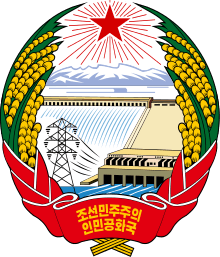Law of North Korea
 |
| This article is part of a series on the politics and government of North Korea |
|
|
| Foreign relations |
The specific hierarchy of authority in North Korea is the words or personal directives of Kim Jong-un; followed by the Ten Principles for the Establishment of a Monolithic Ideological System, WPK directives— particularly the policy guidance of the WPK Secretariat’s Organization and Guidance Department; the WPK Charter and domestic civil laws, and finally the North Korean Constitution. The WPK, while maintaining the dominant political role within the North Korean party-state, came to serve the leader in primacy above all other political entities. As in other communist political systems, the state and society serve the party, and civil laws do not bind the party.[1]
See also
- Judiciary of North Korea
- Law enforcement in North Korea
- List of North Korea-related topics
- Socialist law
References
External links
| Wikisource has original text related to this article: |
- North Korea at the Law Library of Congress
- Full texts of laws on economy and trade at Naenara
- Compilation of Laws and Regulations (For Foreign Investment)
- North Korea at NATLEX (ILO)
- North Korea at FAOLEX (FAO)
- North Korea at WIPO Lex
- Intellectual property laws at Korea Computer Center (archived)
- Criminal Law of the Democratic People's Republic of Korea (1999/2009)
- "Brushes with the Law: North Korea and the Rule of Law" at Keia.org
- "Foreign Investment Laws and Regulations of the Democratic People’s Republic of Korea" at Fordham International Law Journal
This article is issued from Wikipedia - version of the 9/14/2016. The text is available under the Creative Commons Attribution/Share Alike but additional terms may apply for the media files.